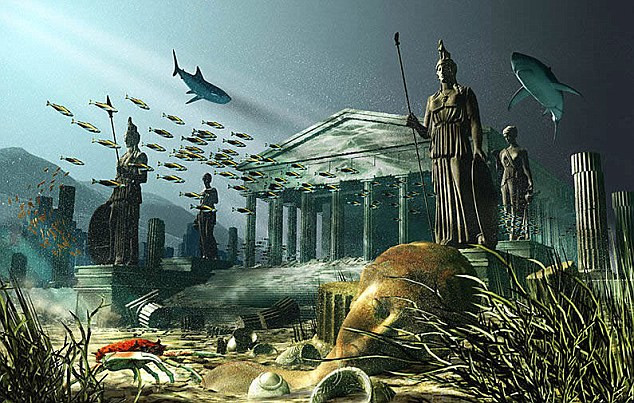New signs of mythical city of Atlantis and its mysterious civilisation found in Spanish marsh
Plato's dialogues and archaeological work point to Atlantis' location adjacent to the strait of Gibraltar.
The documentary, Atlantis Rising, shown on 29 January on the National Geographic channel, documents the most extensive search ever carried out by scientists and archaeologists to find the sunken city of Atlantis.
Taking the viewers on a journey from Santorini in Greece to the Azores Islands, the film examines the many theories that have been advanced over the years regarding the fate of the city and its legendary Atlantean civilisation.
Produced by James Cameron, Atlantis Rising investigates where Atlantis would have been standing at the time of the Bronze Age, and what kind of society it would have been home to.
Following Plato's words
The myth of Atlantis finds its roots in the writings of Greek philosopher Plato. Two of his dialogues, the 'Temaeus' and the 'Critas', dating back to the fourth century BC, refer to the city and its mysterious civilisation, said to have lived thousands of years before the philosopher's time – in the Bronze Age. These two stories are at the centre of this new documentary.
"What we did here is ask the basic question of what is the history behind the myth. Since there are so many books and movies about Atlantis, people often don't realise that the name appears in ancient times only in one place – in Plato's dialogues. We went back to this source and used the way he describes Atlantis as a treasure map, comparing the city's features with existing places," filmmaker Simcha Jacobovici tells IBTimes UK.
The team used some of the world's most advanced navigation and marine archaeology techniques and they combined historical, archaeological, and geophysical evidence with a precise analysis of Plato's texts, to pinpoint the location of the mythical island and find evidence of related artefacts under water.

"We knew we were not going to find the 'Disneyesque' city under water, with statues and ancient buildings still standing, but we hoped to find artefacts and architectural remains that would point to where Atlantis was located", archaeologist Dr. Richard A. Freund, who participated in the project, adds.
"According to Plato, the civilisation was destroyed overnight by an earthquake and a tsunami –and when a tsunami comes in and destroys a city, so my theory was that materials would have been splattered into the Atlantic. This is what Atlantis Rising is about, looking for these artefacts".
A marsh in Southern Spain
Over the years, the most popular theories have been that the present-day island of Santorini or the island of Malta had once been Atlantis. Atlantis Rising explores this hypotheses, but finds more compelling evidence in one of the largest marshes in Europe, in Donaña National Park (Southern Spain) which archaeologists have been excavating for years. This location had already been the subject of another National Geographic documentary, 'Finding Atlantis,' in 2011.
The marsh in question used to be an open bay, adjacent to the strait of Gibraltar. "This is important because Plato says that Atlantis was located adjacent to the Pillars of Hercules, the name given in Antiquity to the promontories at the entrance to the Strait of Gibraltar", Freund explains.
"When you take a writer Plato, one of the most important authors of the Greek civilisation and you have two of this dialogues that talk of Atlantis, you have to take him seriously, even if you don't take him literally. When he gives a very specific geographical note so that all his readers understand the location he is talking about, we have to take him seriously."

In all the other locations visited by the film's team, whether Santorini, Sardinia, Malta or the Azores, a piece is missing from the puzzle, when these places are compared with the Atlantis in Plato's dialogues.
Jacobovici cites the example of Santorini. "It was destroyed overnight in an eruption, like Plato describes, so people say, it must be Atlantis. There are also important architectural similarities with what Plato says, and the Minoan Bronze Age civilisation was technically advanced. But Plato says Atlantis is on the Atlantic side of strait of Gibraltar, and that is not the case with Santorini", he points out.
The film also presents the Spanish location as an interesting candidate since during the documentary's production, a number of massive artefacts, including columns, column drums and Bronze Age anchors, were discovered in the Atlantic, on the Atlantic side of the Strait of Gibraltar.
Traces of an ancient civilisation
More than finding an exact location for a sunken island, the documentary is about exploring who the 'Atlanteans' were.
The film shows that many artefacts and structures share similarities - with signs of the concentric architecture described by Plato - even though they are located thousands of kilometres apart. "In every location we visited, we found the same types of artefacts, the same type of architecture, and the same connections with the Atlantis narrative," Freund says.

The argument put forward in Atlantis Rising is that there might have been a 'mother city' of Atlantis, possibly in Southern Spain, but the Atlantean civilisation then spread out across a very large territory all around the Mediterranean.
"One of the key things I learnt when making this film is that when we say 'Atlantis', we are not talking about a particular spot, but about a civilisation. I think we can find remnants of this civilisation from the eastern Mediterranean all the way to the Atlantic. Southern Spain may have been the centre of a civilisation which spread to Malta, Santorini or all the other places we have investigated," said Jacobovici.
What this civilisation had been when it existed in the Bronze Age and whether other historical sources might refer to it is unclear. The artefacts excavated in the Spanish marsh and in the sea have not yet to be analysed in a lab to find out more about their origins. Only a rigorous scientific and archaeological analysis will determine the history of these objects.
While the film makes an interesting case, it may fail to convince the many historians who believe that Atlantis is just an allegory, a story about moral and ethics for which Plato found inspiration by looking at cities and societies around him. Most academics believe the story of Atlantis may have been the philosopher's warning to Athens and its inhabitants not to become blinded by hubris.
© Copyright IBTimes 2025. All rights reserved.






















